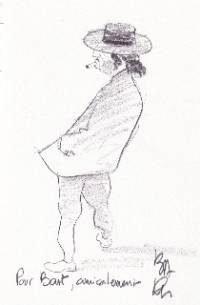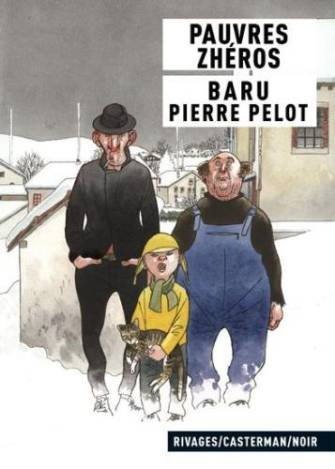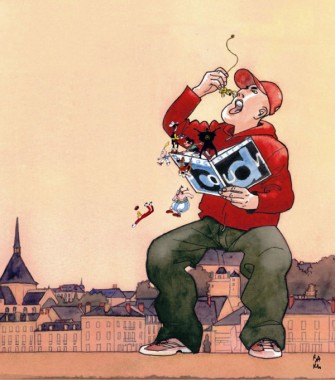 Home > Bart Beaty's Conversational Euro-Comics
Home > Bart Beaty's Conversational Euro-Comics Conversational Euro-Comics: Bart Beaty On Angouleme Grand Prix Winner Baru
posted February 11, 2010
Conversational Euro-Comics: Bart Beaty On Angouleme Grand Prix Winner Baru
posted February 11, 2010

 By Bart Beaty
By Bart Beaty
As I noted in
my brief Angouleme report, the election of
Baru to the presidency of the
Festival is long overdue. The only person to have twice won the prize for best album at the FIBD (in 1985 for the first volume of
Quequette Blues and in 1996 for
L'Autoroute du soleil), Baru has been an important figure in the French comics field for well over two decades and has produced a number of important and well-regarded books.

My own interest in Baru's work is similarly long. When I first started writing about European comics in 1997 for
The Comics Journal, the first column that I penned was on
L'Autoroute (although historians of
TCJ will note that it was actually the second column that actually ran). I fell deeply in love with Baru's work when I first encountered it in the used comic book shops of Montreal, where I snapped up his award-winning semi-autobiographical three-volume
Quequette Blues (now available as a single volume under the title
Roulez Jeunesse (Casterman), and particularly his work for Futuropolis, including
La Communion du Mino (1985) and
Vive la Classe! (1987). His depiction of working class French life, particularly among immigrant Italian communities in France, was so striking and refreshing to me at the time, as I had seen nothing like it in comics before. I found myself following his every move with great interest, and was thrilled when
Drawn and Quarterly began the process of translating him for the American market.
 L'Autoroute
L'Autoroute was the book that convinced me he was an absolutely top-tier cartoonist. The book is an enormous manga-sized expansion of his earlier book,
Cours, camarade! (Albin Michel, 1988). The whole thing simply blew me away, unused, as I was at the time, to such massive comics undertakings. Baru's world was both funny and scary, joyful and violent and his characters -- and drawings -- oozed charm. The first time I attended Angouleme (in 1997), Baru was the only artist for whom I queued for a drawing. I remember that he was gracious enough to do two for me.
Since that time I have conscientiously sought out everything Baru has published, even while I have found some of the books to be a step down from his peak.
Sur la route encore (1997) seemed like a meek sequel to a far better book, and
Bonne annee (1998) lost me with its science-fictiony trappings. The four-volume
Les Annees Spoutnik, about growing up in an immigrant/communist family in the 1950s, was a fascinating return to form, and I really enjoyed the two-volume boxing story
L'Enrage (2004/2006).

Baru's most recent work,
Pauvres Zheros (Casterman, 2008), provides an interesting opportunity to take stock of where the artist is now. An 83-page adaptation of
Pierre Pelot's crime novel of the same name, the book is carried almost entirely by the strengths of the visual register. I haven't read the original novel, but I have to guess that only a small fraction of the text is retained here. Many pages pass wordlessly, and characters are so sketchily outlined that I can't even recall their names, let alone their hopes and dreams. What we get is a series of types (the young teacher, the grifter) and stereotypes (the deranged cat-lady) in a small town in which a developmentally handicapped orphan has gone missing. Like much of Baru's work, this is a tightly claustrophobic story (many of his comics work through the tension of the restrictive provincial life set against the freedom of flight, the open road or the new world).

With very little left to the text, the book succeeds in the construction of characterization through drawings. Few cartoonists letter as well as Baru, who often over-stuffs his word balloons to a painful degree, only to have the characters explode in a fury, with enormous ragged text surrounding them on all sides. Further, his use of facial scars to indicated everything from age and experience to simmering and explosive rage is absolutely unparalleled. Few cartoonists move their characters through such an expansive array of depictions so as to manifest shifting emotional states in a single work.
Pauvres Zheros is a dense little book. One effect of that density is that the extreme violence of the ending seems, to me, to be somewhat uncued. At the same time, the ultimate resolution provided by Pelot is extremely satisfying. For a crime book, I found it much more compelling than Darwyn Cooke's widely-praised
The Hunter, and it is the type of thing that I think would do well generally in the American market. If Baru has lost a step now that he has entered his sixties, you can't really tell it from this.
*****
* random Baru imagery top and bottom; cover to
Cours, Comrade!, sketch given to Bart Beaty, two images from
Pauvres Zheros
*****
To learn more about Dr. Beaty, or to contact him,
try here.
Those interested in buying comics talked about in Bart Beaty's articles might try
here or
here.
*****

*****
*****


